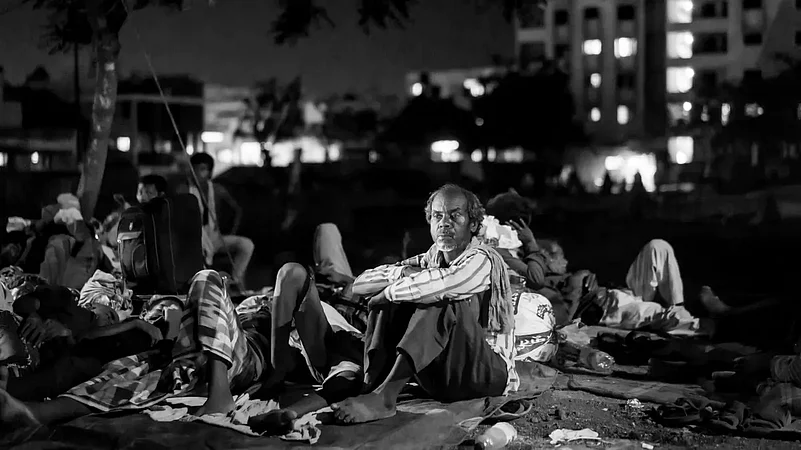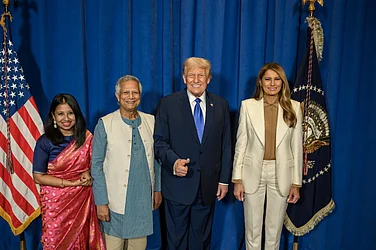The visuals of crowded railway stations, bus stands in metro cities, and migrant workers walking hundreds of kilometers on highways with families and children remain an impressionable and daunting image in my mind as many of us sat in the safe confinements of our homes. Panicked and distressed by the first government-proclaimed lockdown on March 23, 2020, unsure of their future, the "migrants" searched for any possibility that would transport them to the safe havens of their hometowns and villages. A disease that traveled through international boundaries and metro cities, and penetrated remote villages affected those already on the margins of social cleavages the most.
The Covid-19 pandemic all around the world claimed around 6,850,594 lives as per WHO (figures). In America alone, over a million lives were lost between 2020 to 2022. The death tolls in France and Italy are estimated at around 164,829 and 187,850 respectively. India claims that the country has suffered a total of 5.3 lakh deaths in the three Covid waves, however, multiple media outlets and social activists claim that these numbers are much higher in reality.
The first covid case ever identified was on New Year's eve, 31 December 2019 in Wuhan, China. It was later discovered that the virus outbreak started between early October to mid-November 2019 in the country. The catastrophe shattered all resonances of modern-day civilizations as the world experienced a hiatus with roads deserted roads, markets abandoned and industries coming to a halt.
A disaster struck the globe, significantly threatening human safety and life, critical infrastructure, and homeland security. The Disaster Management Act defines a disaster as “A catastrophe, mishap, calamity or grave occurrence in any area, arising from natural or man-made causes, or by accident or negligence resulting in substantial loss of life or human suffering or damage to, and destruction of, property, or damage to, or degradation of, environment, and is of such a nature or magnitude as to be beyond the coping capacity of the community of the affected area”
The effects of the disaster exposed the health system frailties combined with unplanned, hasted government policies and negligence. On January 30, 2020, the World Health Organisation announced the coronavirus outbreak was a public health emergency. However, the outbreak was formally declared a pandemic on March 11 by the UN health agency.
India reported its first infection case on Jan 30, 2020, yet the then US President Donald Trump visited Gujarat, India February between February 24 to 25, 2020, and addressed a public gathering of around 10 lahks in an Ahmedabad stadium as part of the ‘Namaste Trump’ event presided by Indian Prime Minister Narendra Modi. The Union minister of state for external affairs, V. Muraleedharan later said in the parliament that mandatory universal screening of all incoming international passengers started only on March 4. There was no screening of the US delegation for COVID-19 during the visit of US President Donald Trump's rally. The state reported its first case of COVID-19 on March 20.
The havoc wreaked by the Covid-19 virus was perceived by different countries in different ways. India's response was in the form of an emergency under the garb of a harsh and punishing lockdown. An assessment report published in the Lancet in February 2021 concluded that 40 percent of the COVID‐19 fatalities in the US could have been averted. Another Columbia University report conservatively attributed between 130,000 to 210,000 deaths to the failures of the US government. The Trump Administration's response was marked by downplaying the threat, inaction or partial measures, confusion, and inaccurate public statements in the context of the virus spread and its lethality. The US President also publically denounced the usage of masks and ended up contracting the disease during his Presidential campaign in October 2020.
Early covid time: Ethnic minority, greater risk
The UK in the primary stages of the covid-19 outbreak reported that the country's ethnic minority was at a greater risk of succumbing or falling prey to the virus. BBC report quoted Dr Veena Raleigh, an epidemiologist and senior fellow at The King's Fund, saying that at the start of the pandemic, "we knew very little about [Covid-19], how it transmitted, and how to mitigate its spread and impact".
"The virus had its greatest impact on people who were most vulnerable or exposed to the infection, that was older people and people working in frontline jobs, key workers in the NHS, public transport, etc. And of course, ethnic minorities are disproportionately working in those roles," she said.
However, it was not only the case in the UK. In India, marginalized communities were also at a high risk of transmitting the disease due to a number of socio-economic factors. Failing to get tested, access healthcare, and afford hospital beds and oxygen cylinders, a substantial number of covid or covid related deaths in India went unreported in both rural and urban areas. Hunger and poverty only further heightened the effects of the disaster of the pandemic.
The extremity of the disaster and the disastrous management became more evident during the second wave in April to June 2021 as most families across the country struggled to access hospital beds. Images of rows of burning pyres surfaced on social media reflecting how the country was on fire as a result of failed administrative decisions.
Living with the effects of the disaster to date
During the Gujarat Assembly Elections in November 2022, a majority of hawkers and small business people in the state revealed that they were still struggling to make ends meet post the lockdown and pandemic. The findings are the same for the lesser economically flourishing states and Union Territories of India including Jharkhand, Bihar, Uttar Pradesh, Maharashtra, Goa, and New Delhi. The recent inequality Oxfam report exposes the economic disparity exemplified during the Covid, a result of capitalist and government policy collusions.
Diagnosed with Covid-19 in early April 2021, the then 17-year-old Roza, a class 12 student continues to struggle with the aftereffects of the pandemic physically, mentally, and socially. Roza was diagnosed with Parosmia a month after she recovered from the covid by the end of April 2021.
Around 65per cent of people, infected with the virus will temporarily lose their sense of smell, known as anosmia, and at least 10per cent of the cases develop parosmia, or a rarer condition, phantosmia, when you smell something that isn't there. Some clinical studies have also suggested that parosmia affects over 40 to 50 per cent of people with covid-related anosmia.
Science is still searching for the causes behind Parosmia, it is however suggested that the covid infection causes inflammation resulting in the damage of nasal receptors and nerves, thus ending up in a distorted sense of smell among patients. Speaking with Outloook, Roza shared that her doctor initially rejected her experience and suffering from the smell and taste dysfunctionality. "For over one year, I have quit eating non-vegetarian food. I also do not eat food cooked in oil, onion, or garlic," she said adding that from June 2021 to October 2022, she had to use a nose clip every time she would eat anything. She also said that detergent, soap, and shampoos also smelled of petroleum and chemicals in the initial stages of her parosmia.
"Even water smelled and tasted like rotten meat to me at that time. Initially, I would feel that something peculiar smelling like garbage clogged my nasal cavity," Roza says as she continues looking for a treatment for her condition.


























